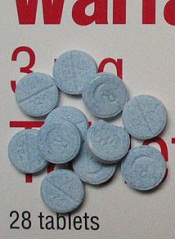
SAN FRANCISCO—Patients with atrial fibrillation (AF) who are taking warfarin have a higher risk of kidney problems if their anticoagulation levels are not properly managed, according to a new study.
Researchers found that patients who had low times in therapeutic range were significantly more likely to develop renal dysfunction and experience renal failure.
Furthermore, all patients were at risk of developing renal dysfunction, whether they began the study with healthy kidney function or moderate to severe kidney disease.
T. Jared Bunch, MD, of Intermountain Medical Center Heart Institute in Salt Lake City, Utah, and his colleagues presented these findings during the Heart Rhythm Society’s 37th Annual Scientific Sessions (abstract PO02-210).
The researchers studied 2753 AF patients who were anticoagulated with warfarin and managed by Intermountain Healthcare Clinical Pharmacist Anticoagulation Services.
The patients’ mean age was 74.7±10.7, and 50.3% were male. The patients had a baseline creatinine level of less than 2.0 mg/dL or a glomerular filtration rate greater than 30 and serial renal function studies.
Dr Bunch and his colleagues stratified patients into 4 categories based on the amount of time their international normalized ratio levels were determined to be in the therapeutic range (TTR): >75%, 51% to 75%, 26% to 50%, and <25%.
The researchers then performed multivariate, adjusted analyses to calculate odds ratios (ORs) for renal dysfunction and hazard ratios (HRs) for renal failure based on TTR group. The >75% group was the reference.
Among patients with baseline creatinine ≤2.0 mg/dL, the OR for a 25% increase in creatinine was:
- 1.35 for the 51%-75% TTR group (P=0.06)
- 1.80 for the 26-50% TTR group (P=0.003)
- 2.34 for the ≤25% TTR group (P=0.003).
Among patients with baseline creatinine ≤2.0 mg/dL, the HR for renal failure was:
- 1.72 for the 51%-75% TTR group (P=0.001)
- 2.36 for the 26-50% TTR group (P<0.0001)
- 2.38 for the ≤25% TTR group (P<0.0001).
Among patients with baseline glomerular filtration rate >30, the OR for a 25% decrease in glomerular filtration rate was:
- 1.45 for the 51%-75% TTR group (P=0.03)
- 1.46 for the 26-50% TTR group (P=0.08)
- 1.52 for the ≤25% TTR group (P=0.20).
Among patients with a baseline glomerular filtration rate >30, the HR for renal failure was:
- 1.88 for the 51%-75% TTR group (P<0.0001)
- 2.40 for the 26-50% TTR group (P<0.0001)
- 2.60 for the ≤25% TTR group (P<0.0001).
The researchers said these results suggest the quality of anticoagulation management is associated with renal dysfunction and failure, so improving anticoagulation control might improve the long-term risk of end-organ injury in AF patients.
“Patients who use warfarin as part of their anticoagulation treatment for atrial fibrillation should have their anticoagulation levels closely monitored to ensure proper levels,” Dr Bunch said.
“Those who have erratic levels of warfarin despite close monitoring and care should consider other approaches such as newer anticoagulants that have more predictable blood effects, even if they have moderate kidney disease, and non drug-based methods to lower clot risk with atrial fibrillation.”


